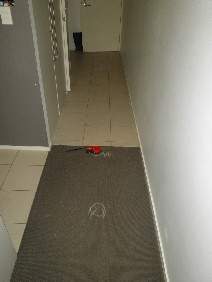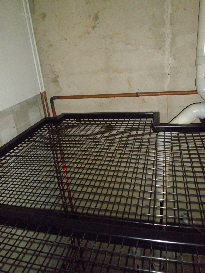When coring through concrete the core hole must come out somewhere?
Locating the precise location where a core hole will come through the concrete (the exit point) can be difficult especially when the level below doesn’t resemble the upper level.
Concrete Diagnostics can assist with the precise location of the exit point so as to avoid underlying services such as gas or water pipes, supporting brackets, etc.
The images below show an example of an exit point location. The proposed core hole location, if not checked would have come out directly above the natural gas pipe line, which could have caused a potentially dangerous scenario.







